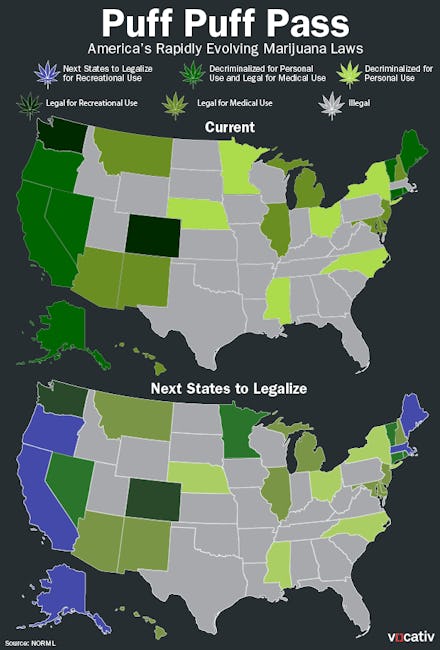Where Will Marijuana Be Legal Next? This Map Points to 5 Specific States

When United States Attorney General Eric Holder announced that a new federal policy was in the works to make it easier for pot businesses to deal with federal banks (which was pretty major considering the current limbo state of the legal pot business economy), supporters of marijuana legalization rejoiced.
As it stands now, medical marijuana is legal in 20 states and Washington, D.C., while recreational marijuana is legal in Colorado and Washington. Legalization efforts and ballots are making real progress in a number of states including New York, Tennessee, Florida, Arizona, Kentucky, Maryland, New Hampshire and Alaska.
But who will actually legalize next? Allen St. Pierre, the executive director of the National Organization for the Reform of Marijuana Laws, discussed in a Vocativ story what he believes are the five states most likely legalize either medical or recreational marijuana next.
Image Credit: Vocativ
Based on a combination of factors including polling data, the current legal frameworks in place, and ballot measures in the works, St. Pierre believes California, Oregon, Alaska, Maine and Massachusetts are the five states most likely to move forward with legal weed.
"[Legislators are] clearly responding to public sentiment," St. Pierre said. "Eighty-five percent of the public want medical marijuana. If you are a politician not listening to 85% of the public, you are a schmuck."
California, Oregon, Alaska and Maine all passed medical marijuana laws in the '90s (Massahusetts' was in 2012), and have strong records of public support. St. Pierre said that the process to legalize usually takes anywhere from four to seven years, but these five states look ready to make a change soon.
"Looking out to 2016, if Oregon does not vote to legalize marijuana this time around, it'll be on the ballot with California, Massachusetts, and Maine," he said. "Those are all states that are primed for the initial process to legalize."
According to Gallup, in addition to the 85% of Americans who support legalizing medical marijuana, 73% support decriminalizing weed, and 58% support full legalization — a nearly 50% increase from 40 years ago. St. Pierre believes a number of factors have led to this change: Baby boomers (who had ample experience with marijuana in the 1960s and 1970s) are now in charge of media, corporations and government; the Internet makes publishing and sharing information on legalization much easier; the use of medical marijuana in the health field has made significant progress; and ample money can be made from legalization.
Quite simply, there's a U.S. pot revolution afoot, but it shouldn't come as too much of a surprise. Besides the shift in public opinion, there's a lot of money to be made in the legal pot business — some estimates put the numbers in the hundreds of billions of dollars.